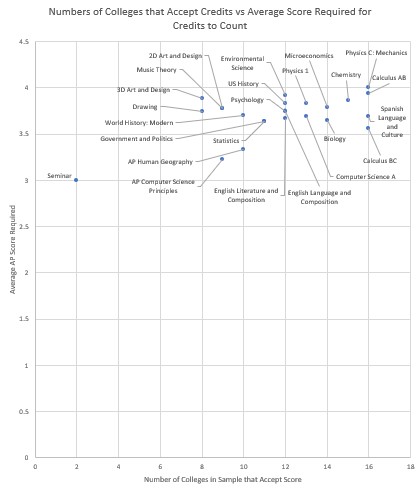Now that the school year is in full swing, freshmen and seniors alike are slowly but surely getting adjusted to their new classes. However, with AP Exam Registration in November, students should know which AP Exams they truly wish to take if they want to save hundreds of dollars and countless study hours.
Important Information
Before reading this article, here is some information to keep in mind. First, taking an AP Exam is not the same as taking and AP class. Excelling in an AP class often means an additional 1-point bonus to your GPA on your transcript. While colleges may look at how well you did in an AP class, due to different teaching and grading styles that may skew the reality of how well a concept was understood by a student, grades in an AP class are not the primary thing that they look at. Instead, they look your AP Exam, which is a CollegeBoard administered test that is taken in May each year to access your understanding in a course. Based on your score, you can receive a number from 1 to 5, with 5 being the best score that you can get and most colleges only accepting scores from 3 and up. If you receive a score within a college or university’s range, you could exempt out of that class, reducing your stress and time in college/university.
Nonetheless, not taking an AP Exam does not mean that you shouldn’t study for an AP class. AP classes can give immense boosts to a person’s GPA, which is not something to take lightly, especially in later grade levels. Also, even if a college or university does not accept AP credit, it will still look at the AP classes – and the resulting grades – that a person had. A bad grade in multiple AP classes could be a make or break into a dream school.
Unfortunately, there are many hidden downsides of these AP Exams, one being the $97 required to pay for the exam (not including late registration, cancellation fees, or fee waivers). Even if a person does not make it to exam, CollegeBoard will not give refunds for exams. Moreover, an extra fee is required to send scores to colleges, many of which (most commonly prestigious school) do not accept AP credits at all. For instance, both the AP Seminar class and AP Precalculus class are relatively new, meaning most institutes have not made score ranges for them. While these classes are extremely useful for harder classes (ex: AP Calculus, AP English Language and Composition, etc.), they could be a waste of money unless you plan to go to one of the few institutes that accept them.
Rankings
The utility of these different exams has been sorted into 4 distinct categories: Recommended, worthwhile, and decent, and unrecommended. These categories are based on the average score required to get credit and the number of schools that accept credit. Please note that there are multiple ways to assess which AP Exams are worthwhile – such as difficulty, preferences, or scheduling issues – but that is more of a personal matter to discuss with a counselor or family. Additionally, the statistics in this article are based on a sample of the following 16 colleges and universities: Harvard University, Georgia Institute of Technology, Brown University, Cornell University, Stanford, Yale, Kennesaw State University, University of Georgia, Dartmouth College, Michigan State University, Boston University, University of Mississippi, Georgia State University, University of Miami, Emory University, and Augusta University.
The format of the rankings will be as the following: Class (Average Score Required). Furthermore, seeing that the values in this article are only averages, it is important to double check the AP credit policies of schools you want to apply for on the CollegeBoard website.
Recommended Exams:
Microeconomics (3.7857), English Language and Composition (3.75), Psychology (3.75), Computer Science A (3.6923), Spanish Language and Culture (3.6875), English Literature and Composition (3.6667), Biology (3.6429), and Calculus BC (3.5625) are some of the best exams to take. These exams are not only accepted by a wide range of schools (including many ivy leagues), but the exam score requirements for these courses are not as high as those in the “worthwhile exams” category. Therefore, if applicable, these should be the main focus when studying for exams and researching which courses to take.
Worthwhile Exams:
The next best exams to take are Physics C: Mechanics (4), Environmental Science (3.9917), Calculus AB (3.9375), Chemistry (3.8667), Physics 1 (3.8333), US History (3.8333), World History: Modern (3.7), Government and Politics (3.6363), Statistics (3.6363), and Human Geography (3.3333). The classes in this list are great choices, but they tend to lead students into two main traps. The first trap is that some classes (ex: AP Calculus AB and AP Chemistry) are accepted into many schools yet require high scores to allow students get exempted for colleges. While this is a good motivator to study, it is not a good idea for students that plan to take many AP exams. The second trap is the opposite of the first trap: the classes have low score requirements but are not accepted into many schools (ex: Human Geography and Statistics). These classes tend to be more passion-directed than classes from the first trap, so even though it is not wise to take an exam that only some colleges accept, they are good options to take as classes.
Decent Exams:
3D Art and Design (3.88), 2D Art and Design (3.78), Music Theory (3.7778), Drawing (3.75), and AP Computer Science Principles (3.2222), while good, these classes are considered mediocre at best when it comes to testing. These classes are mainly moderate effort and low result classes as they are not too difficult, yet do not receive credit in about 44% of colleges. These exams should only be taken if your desired college accepts them.
Unrecommended Exams:
While almost every AP exam in Kennesaw Mountain can be used to exempt classes in most colleges, Precalculus and Seminar have significantly less acceptances in colleges. Thus, it is not recommended to take an AP exam in either class. However, taking these classes can immensely improve your abilities in AP exams that do award credit. AP Precalculus can teach many of the basic skills to excel in AP Calculus AB and AP Calculus BC. Similarly, AP Seminar can improve analytic writing skills, which is necessary in classes like AP English Literature and Composition and AP US History. Moreover, these classes will show to college admission offices that you were willing to accept rigorous classes.
Final Thoughts
The decision of what AP exams to take varies from person to person. However, for those taking many AP classes or are unsure of what AP classes to take, exams from the Recommended and Worthwhile rankings are the safest option.
All information was found from the “AP Credit Policy Search” on the Collegeboard website.
















